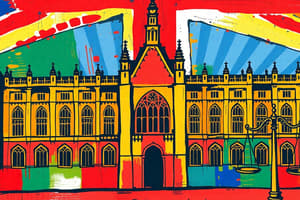Podcast
Questions and Answers
According to A.V. Dicey, which statement accurately describes Parliamentary Sovereignty?
According to A.V. Dicey, which statement accurately describes Parliamentary Sovereignty?
- Parliament possesses the power to enact or repeal any law, without recognition of any body's right to override its legislation. (correct)
- Parliament's legislative actions must align with prior Acts passed by previous Parliaments.
- Parliament's authority is subject to the monarch's approval on legislative matters.
- Parliament shares legislative power equally with the House of Lords.
Which of the following is a valid criticism of Parliamentary Sovereignty?
Which of the following is a valid criticism of Parliamentary Sovereignty?
- It unduly strengthens the judiciary by allowing judicial review to easily overturn parliamentary acts.
- It can potentially lead to a constitutional crisis if Parliament passes laws that undermine the rule of law. (correct)
- It prevents the Parliament from adapting to current social norms.
- It ensures that Parliament is always aligned with international legal standards.
Which historical event significantly shifted the balance of power from the monarchy to the Parliament?
Which historical event significantly shifted the balance of power from the monarchy to the Parliament?
- The Act of Settlement 1701
- The Magna Carta of 1215
- The Parliament Act of 1911
- The English Civil Wars of 1642-1649 (correct)
What function does the Monarch serve in the UK's 'Crown-in-Parliament' system today?
What function does the Monarch serve in the UK's 'Crown-in-Parliament' system today?
Which of the following is a primary function of the UK Parliament?
Which of the following is a primary function of the UK Parliament?
What is the role of the Speaker in the House of Commons?
What is the role of the Speaker in the House of Commons?
What is the function of the Shadow Cabinet within the UK political system?
What is the function of the Shadow Cabinet within the UK political system?
The English Bill of Rights 1689 provides for:
The English Bill of Rights 1689 provides for:
According to Jeffrey Goldsworthy, what is the relationship between parliamentary sovereignty and common law principles?
According to Jeffrey Goldsworthy, what is the relationship between parliamentary sovereignty and common law principles?
Which of the following statements is true regarding the House of Lords?
Which of the following statements is true regarding the House of Lords?
In the UK Parliament, what is the primary role of parliamentary committees?
In the UK Parliament, what is the primary role of parliamentary committees?
In the context of UK Parliament, what is the significance of the Magna Carta of 1215?
In the context of UK Parliament, what is the significance of the Magna Carta of 1215?
Which of the following is a recognized privilege of the UK Parliament?
Which of the following is a recognized privilege of the UK Parliament?
According to the provided information, what action related to parliamentary privilege led to the Parliamentary Papers Act of 1840?
According to the provided information, what action related to parliamentary privilege led to the Parliamentary Papers Act of 1840?
Why was Strauss held liable for libel in Re Parliamentary Privileges Act 1770 (1958) AC 331?
Why was Strauss held liable for libel in Re Parliamentary Privileges Act 1770 (1958) AC 331?
Which statement best describes the limitations on absolute privilege for publishing defamatory statements?
Which statement best describes the limitations on absolute privilege for publishing defamatory statements?
Which of the following statements is most accurate regarding the composition of the British Parliament?
Which of the following statements is most accurate regarding the composition of the British Parliament?
What was the key provision of the Act of Settlement 1701?
What was the key provision of the Act of Settlement 1701?
What is a quasi-judicial function performed by the Speaker?
What is a quasi-judicial function performed by the Speaker?
Flashcards
Parliamentary Sovereignty
Parliamentary Sovereignty
The principle that Parliament has the right to make or unmake any law, and no entity can override its legislation.
Three aspects of Parliamentary Sovereignty
Three aspects of Parliamentary Sovereignty
Parliament can legislate on any matter, is not bound by previous Parliaments, and cannot be overruled by any other body.
Magna Carta (1215)
Magna Carta (1215)
Written legal boundaries established to limit the monarch's power.
Bill of Rights (1689)
Bill of Rights (1689)
Signup and view all the flashcards
House of Commons
House of Commons
Signup and view all the flashcards
House of Lords
House of Lords
Signup and view all the flashcards
Main powers of Parliament
Main powers of Parliament
Signup and view all the flashcards
Functions of Parliament
Functions of Parliament
Signup and view all the flashcards
Scrutiny of the executive
Scrutiny of the executive
Signup and view all the flashcards
Two main components of Parliamentary Privilege
Two main components of Parliamentary Privilege
Signup and view all the flashcards
English Bill of Rights (1689), Art.9
English Bill of Rights (1689), Art.9
Signup and view all the flashcards
Re Parliamentary Privileges Act 1770
Re Parliamentary Privileges Act 1770
Signup and view all the flashcards
Study Notes
Parliamentary Sovereignty
- Parliamentary Sovereignty is the right of parliament to make and unmake any law
- No person or body is recognised by the law of England as having a right to override or set aside the legislation of parliament
- Parliament can legislate on any subject-matter
- No parliament can be bound by any previous parliament, nor can a parliament pass any Act that will bind a later parliament
- No other body has the right to overrule or set aside an Act of parliament
- Parliamentary sovereignty is not subordinate to common law principles like rule of law
- Parliamentary sovereignty is not a creation of judicial interpretation, rather than inherent legal authority
- Parliament possesses unlimited power and contends that Parliament cannot legally limit its own powers through self-imposed constraints
- European law and judicial review may influence the practical exercise of sovereignty of parliament, but they do not fundamentally alter its existence
- Enacting laws that undermine the rule of law may lead to a constitutional crisis
- The role of the judiciary is underestimated where judicial review has challenged legislative acts deemed unconstitutional
- Parliament’s authority can be exercised within a framework that respects both legislative intent and procedural integrity
Shifting Power
- The House of Lords complements and mirrors the work of the Commons, but its powers have been weakening since at least the 17th century
- 1215: Magna Carta established written legal boundaries on what a monarch could or could not do
- 1265: The House of Commons began to emerge as a separate entity in the parliament convened by Simon de Montfort
- 1642-1649: The English Civil Wars transformed the balance of power from the king to the Parliament
- Bill of Rights 1689: Parliament became de-facto sovereign of the State
- The election of members of parliament ought to be free
- The power of the King of suspending or dispensing with laws without the assent of parliament is illegal
- The Act of Settlement 1701: The king occupies a throne not because he was a member of the royal family, but under parliamentary title
- The Parliament Act of 1911 curtailed the powers of the House of Lords
- All legislative power relating to money bills was taken away from the House of Lords
- By the end of the 18th century, the supremacy of the Commons had been fairly clearly established
- The history of the development of the British Constitution could be characterised as a slow but steady handing over of the prerogative and unaccountable powers of a single sovereign to the control of an accountable Parliament
- Parliamentary democracy exists alongside a constitutional monarchy
British Parliament
- Consists of the House of Commons (elected chambers), House of Lords (appointed second chamber) and The Crown Institution (King/Queen)
- The House of Commons is the Lower Chamber with 650 elected members of parliament
- The Speaker and 3 deputies are elected by the MPs and preside over the house
- The PM has to select a government from the MPs elected from the House of Commons and peers who are members of the House of Lords
- The House of Commons has predominance over the House of Lords
- The House of Lords originally had hereditary membership until 1999, when only 92 peers could inherit their position
- Now the majority of members are selected by the PM based on expertise
- The Crown-in-Parliament once exercised supreme rule over all executive, legislative and judicial matters until the 13th Century
- Today, the Monarch has a symbolic function as Head of the State, through conventions on an apolitical basis
Main Powers and Roles
- The UK parliament has the power to assent to or deny bills
- Parliament is sovereign and implements public policy programmes
- No other institution can produce legislation that overrides parliament
- MPs represent their constituencies and participate in debates
- MPs vote on legislation and serve on parliamentary committees
- Parliamentary committees scrutinise government actions and help ensure accountability, transparency and effective governance
- The Speaker presides over debates and determines the order in which members speak
- The Speaker performs a quasi-judicial function when dealing with internal disciplinary issues concerning the conduct of the MPs
- Parliament determines whether a bill is a money bill
Opposition and Shadow Cabinet
- The opposition raises reasoned objections to legislative proposals and criticises government performance
- The opposition presents itself as a 'govt in waiting'
- The opposition has alternate policies, an alternate leader, and a government team (Shadow Cabinet)
- The Shadow Cabinet scrutinises the government through Shadow Cabinet Members, known as Shadow Members
- Shadow members monitor and critique the work of their corresponding Government Ministers
- The Shadow Cabinet develops alternative policies which are formulated and presented to the public and debated in Parliament
Functions of Parliament
- Representation: Representing the views and interests of the electorate
- Deliberation: Debating and discussing issues of public importance
- Legislation: Making and amending laws
- Authorizing expenditure: Approving government spending
- Making governments: Forming and supporting the government
- Scrutiny: Holding the government to account
- Both the Commons and the Lords perform three main functions: passing legislation, scrutiny of the executive, and providing ministers
- The House of Commons has exclusive power to give consent to taxation
- The House of Lords cannot interfere in the passage of money bills, but can amend non-financial legislation
- Scrutiny of the executive is done by the opposition in parliament, done various ways- Questions to ministers, select committees, debates
Privileges of UK Parliament
- The grant of Parliamentary privileges to the MPs can be traced to the struggle between the King and the Parliament through the English Civil War of 1642-49 and the Glorious Revolution of 1688
- In the absence of a codified constitution, these privileges have been demanded from the monarch by the Speaker of the House of Commons as a symbolic gesture at each parliamentary session
- Two main components: freedom of speech and exercise by Parliament of control over its own affairs (exclusive cognisance)
- English Bill of Rights 1689, Art.9 provides freedom of speech and debates or proceedings in Parliament
- Parliamentary actions should not be impeached or questioned in any court or place outside Parliament
- The freedom of speech and debate for MPs of each House is a cornerstone of Parliamentary democracy
- A v The United Kingdom (2003) 36 ECHR 51: A case was filed in the ECHR for defamation against an MP after he accused another of criminal activities
- The Court found that the inability of a member of the public to sue a Member for defamatory words spoken in Parliament was justified to protect free debate in Parliament in the public interest
Qualified Privileges
- Qualified privileges are mainly for members and staffs of parliament and other legislative and official bodies
- Stockdale v Hansard (1839) 9 Ad & El 1: A report published as indecent and obscene by the official printer for the House of Commons was sued for libel
- It was determined that The House of Commons does not possess an absolute privilege to publish defamatory statements
- Although the Parliament has certain privileges, it could not infringe on individual rights outside parliamentary proceedings
- The Parliamentary Papers Act 1840 protects Parliamentary publications with parliamentary privilege, if the Speaker duly issued a certificate
- The Defamation Act 1996 provides that publication of any report be privileged unless malice is shown
- The Parliamentary Privilege Act 1770 aims to clarify and limit the scope of Parliamentary privileges
- Re Parliamentary Privileges Act 1770 (1958) AC 331/ Strauss Case: MP Strauss wrote a letter to another MP making allegation against London Electricity Board and was sued for defamation
- The act allows for legal actions against MPs, but it does not extend to actions based on speeches or proceedings made within the Parliament
- There are no absolute Parliamentary Privileges outside formal parliament proceedings
- The communication between MPs does not fall within the ‘proceeding of parliament’ and Strauss can be held liable for libel
Studying That Suits You
Use AI to generate personalized quizzes and flashcards to suit your learning preferences.




